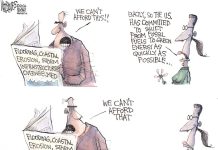It is hard to believe that I just finished my 30th legislative session working as either a staffer for the House of Representatives or as a lobbyist in varying capacities. And things have definitely changed.
From day one, I fell in love with the legislative process, fascinated by the relationships and strategic thought process needed to get things accomplished. Over the years, I have been fortunate to meet many wonderful people and build relationships on the Republican and Democratic side that have lasted throughout my career.
As I reflect on my first session in 1993, many things jump out at me, but at the top is camaraderie and respect. I remember watching legislators from different political parties debating issues on the floor, sometimes having fun asking questions they knew the other one didn’t know, pointing out discrepancies in a bill, or strongly speaking out against its passage. But when all the debating was done, there was still respect for one another. Legislators regularly gave each other a pat on the back and later met for a drink at the Press Club. Colleagues conducted themselves with grace, dignity and respect so that nothing was taken personally.
Over the past 30 years, little by little, the atmosphere of mutual respect in the General Assembly has changed, and for the worse.
Long gone is the respect for differing opinions. Where there was once civil debate, now far too often debate on critical social issues, which come with strong personal beliefs of legislators and their constituents, begins and ends with divisiveness, ill-will, and personal attacks. I understand when a legislator needs to draw a line in the sand, but that seems to have become more the norm than the exception.
The supermajorities Republicans enjoy have only increased the climate of divisiveness and an unwillingness to compromise and negotiate. When the balance of power was closer, legislators had to work together and, in my view, better public policy evolved.
The sad part I see in all of this is how it has impacted the development of public policy. With a part-time legislature (and I am certainly not advocating for a change) it is hard to find time to connect with elected officials. The general public does not have the same access to legislators as those of us who work the hallways.
I strongly believe that it is critical for constituents to have access to their elected officials and have their voices heard. With cell phones and other technology, the need for legislators to come out into the hallway to talk has lessened and I am not sure that is a good thing.
There seems to be less interest in hearing from real people — constituents whose lives will be personally impacted by the legislation. Some committees require people who want to testify to sign up online the night before a hearing. How does a regular citizen know they need to do that? In addition, many committees strictly limit the length of testimony.
While I understand the need for a time limit, those who work in the hallway have access to committee members outside of the meeting. What about the person who takes time off work to make the trip to the Statehouse to tell their story in hopes that it makes a difference?
Even more worrisome is the practice of some legislators who will not meet with anyone on legislative issues. Legislators are voted into office by people in their district. If, once elected, they find no value in their input, why are they there?
Sadly, Hoosiers are the ones losing in this equation. We need legislators willing to work across the aisle even if they do hold the majority of power. We need responsive lawmakers who believe and know that they work on behalf of their constituents. That means listening and being available to your constituents. Working behind closed does not garner trust in a system that is already deemed untrustworthy.
Kim Dodson has served as the Chief Executive Officer of The Arc of Indiana since July 2015. She first joined The Arc of Indiana in 1998 as director of government relations and moved into the role of associate executive director in 2006. This commentary previously appeared on indianacapitalchronicle.com. Send comments to [email protected].




